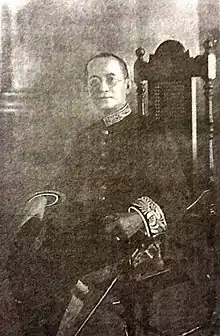Joseph Augustus Maung Gyi
Sir Joseph Augustus Maung Gyi (Burmese: ဆာ ဂျိုးဇက် အော်ဂပ်စတပ် မောင်ကြီး; 12 December 1871 – 9 March 1955) was a Burmese barrister, judge, diplomat, politician and administrator who served as the Acting Governor of British Burma during the tenure of Charles Alexander Innes, who was away on sick leave in the United Kingdom. At various other times during the colonial era he served as Minister of Agriculture, Excise and Forestry, of Education and Public Health, of Home Affairs, and as Minister for Transferred Subjects.
Joseph Augustus Maung Gyi | |
|---|---|
 | |
| Minister of Forestry of British Burma | |
| In office 1921–1922 | |
| Minister for Education and Public Health of British Burma | |
| In office 1925–1926 | |
| Minister of Home Affairs of British Burma | |
| In office 1926–1930 | |
| Preceded by | May Oung |
| Governor of British Burma Acting | |
| In office 1930–1931 | |
| Preceded by | Charles Alexander Innes |
| Succeeded by | Charles Alexander Innes |
| Myanmar Ambassador to the United Kingdom | |
| In office 1947 – April 26, 1948 | |
| Succeeded by | U Ohn |
| Myanmar Ambassador to India | |
| In office March 1949 – 1950 | |
| Preceded by | Aung San |
| Succeeded by | Win (Burmese diplomat) |
| Personal details | |
| Born | Maung Gyi 12 December 1871 Moulmein, British Burma |
| Died | 9 March 1955 (aged 83) Rangoon, Burma |
| Spouse(s) | Phwar May |
| Children | Khin Myint |
| Parents | U Khin (father) Daw Yin |
| Alma mater | |
| Occupation | Barrister, Political figure, Administrator, Minister, Diplomat |
Early life and education
Maung Gyi was born on 12 December 1871 in Moulmein, British Burma to ethnic Mon parents U Khin and his wife Daw Yin. After graduating from St. Paul's English High School, he studied law at Rangoon College, and continued his education in England. He was also educated at Oxford University, Brussels College and St. Mary's College in the UK. In 1901, he returned to Burma and worked as a barrister for 11 years. In 1911 he was called to the bar by the Middle Temple.
Life
- From 1911 to 1920, he practised as an advocate at the Chief Court of Lower Burma, was a lecturer in law at Rangoon College and Deputy Registrar at the Chief Court.
- In 1917, he was appointed Senior Adviser to the Governor of British Burma.
- In 1920, he organised, and became President of the Council of National Education.
- In January 1923, he became Minister in charge of Agriculture, Excise and the Forest Departments of Burma.
- In November 1924, he was appointed judge at the High Court in Rangoon.
- In 1925, he was appointed Minister for Education and Public Health on the introduction of Dyarchy.
- He defended the Reverend I Ottama and other political leaders in trials for sedition.
- He was Vice-Chairman of the Bar Council, President of the Freedom League, Chairman of the Rangoon Labour Bureau, President of the National Sporting Club and Chief of the National Volunteer Organisation.
- In July 1926, he became a Member of the Executive Council of the Governor of Burma, and later was appointed Minister of Home Affairs.
- In January 1927, he was made Knight Bachelor in the 1927 New Year Honours.
- In August 1930, he was the 'acting' Governor of Burma during the tenure of Charles Alexander Innes, who was away on sick leave in the UK during the rebellion of Saya San.
- In May 1932, he was reappointed Minister of Forestry.
- In October 1932, he became a member of the Legislative Council of Burma.
- In January 1933, he became the Minister for Transferred Subjects.
- In August 1940, he became the President of the Senate.
- In 1937 he was elected President of the Senate, which position he occupied until 1940.
- In 1940, he was appointed as a Counsellor to the Governor.
- During the Japanese occupation he was appointed by the Burmese Government as a judge of the Supreme Court.
- From 1946 to 1947, he was a Member of the Executive Council, in charge of Public Works and Rehabilitation.
- From November 6, 1947 to January 1948, he was the High Commissioner for Burma in London.[1]
- From January 1948 to 26 April 1948, he was the first Burmese Ambassador to London.
- From March 1949 to 1950, he was Burmese Ambassador in New Delhi.[2]
Legacy
Maung Gyi is remembered positively for his leading role in establishing Rangoon University, his research on traditional Myanmar drama and his efforts to publish the Tripitaka, or Buddhist scriptures.
Personal life and death
Maung Gyi married Phwar May who lived in Lampang, Thailand. They have only one daughter Khin Myint. He passed away on 9 March 1955 at the age of 83 at his residence in Golden Valley, Rangoon, Burma.
References
- "Colonial Burma's Only Local Governor Dies". The Irrawaddy. 2019-03-09. Retrieved 2019-03-10.